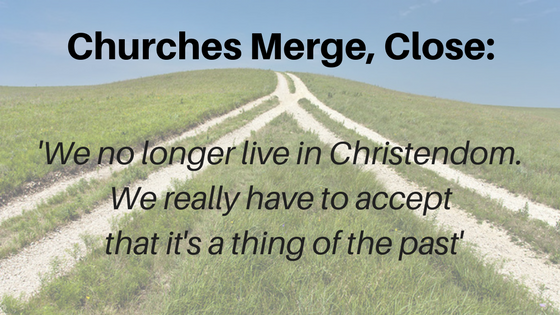

(By Jonathan M. Pitts, The Baltimore Sun). For a decade and more, Govans Presbyterian Church and Brown Memorial Woodbrook Presbyterian Church have labored in the manner of many mainline Protestant congregations: Working ever harder to provide spiritual resources for dwindling number of congregants.
Govans, on York Road in North Baltimore, has been hosting its Sunday night dinners for the poor and helping lead GEDCO, the social service organization it co-founded in 1984.
Brown Memorial Woodbrook, about two miles from Govans on North Charles Street, has been running its busy Sunday school and community garden and working on LGBT equality and other social justice issues.
But with attendance stagnating, maintenance costs rising and the population of Christians from which to draw shrinking, the two have decided to join forces. If the Baltimore Presbytery gives its approval next month, they’ll become one congregation before the end of the year, bringing more than 280 worshippers and 230 years of history together under one roof.
The merger would be the latest example of an increasingly common phenomenon: faith leaders closing or consolidating houses of worship as a way of adjusting to a culture that has grown less hospitable to their mission.
The Episcopal Diocese of Maryland has closed a net eight churches since 2007 and plans to shutter one more — 174-year-old St. John’s Episcopal Church in Charles Village — if the congregation can’t present a feasible financial plan by January.
The Delaware-Maryland Synod of the Evangelical Lutheran church has consolidated eight of its smaller churches into three.
The Archdiocese of Baltimore has launched a long-term plan to reallocate resources over several years, including folding parishes into a smaller number of worship centers called pastorates.
Two historic Reform Jewish synagogues — Temple Oheb Shalom in Park Heights and Har Sinai Congregation in Owings Mills — have announced they will likely combine.
And Bishop James L. Davis, presiding prelate of the second district of the African Methodist Episcopal Church, which includes Maryland, has directed all 411 congregations in the jurisdiction to spend six months taking a “hard, possibly painful” look at their own operations.
Each church is to address a set of questions — How much has your congregation grown? how many visitors have you had? would you attend your church if you weren’t a member? — and weigh a range of options, from staying on course to shutting down.
It’s set to begin in February.
“Our first step will be trying to get people to converse one with another, and come to some understanding themselves about what might need to be done, before our rules and regulations have to move in and do what may be inevitable and necessary,” Davis says.
The driving force behind the trend is the well-documented decline in Americans’ commitment to organized Judeo-Christian religion.
6 Comments. Leave new
This is a very strangely written article for a Presbyterian or Christian New source. It seems to me to celebrate that Christiandom is gone and we have to accept that. It almost has a good riddens tone to it. Maybe the author should have been more specific like “Liberal PCUSA Christiandom is gone” That would be more accurate. Paula should visit a EPC Presbytery meeting and she would find that Christiandom is very alive and exciting and growing here and abroad. No Paula, real Christiandom is as alive and powerful as our Lord Jesus Christ, what is dying is Christian pretense.
The article was written by Jonathan Pitts, of the Baltimore Sun, not by Layman Editor Paula Kincaid. The Layman links to articles such as this that the PLC Staff believes would be of interest to Layman readers, but such links should not be construed as endorsement by the PLC staff.
In terms of contextualization. The subject was the decline into extinction of mainline, liberal Protestantism in a post industrial American city and area. And yes in that context it is indeed the collapse of their systems.
On a macro-global sense the faith may never has been as good as today. Each year more Christian baptisms happen in India and China than the total membership of the PCUSA and ECUSA combined. 1st Baptist Orlando (SBC) has more members than the total reported members of Presbyterians in Florida. More people go to church in the city of Lagos Nigeria every Sunday than the entire state of Illinois. So yes, in the greater developing world and global South, the faith is doing quite well. It is the in the post-Christian, post-faith leftist religious entities things are not so good. As the old saying goes, one should not expect something from nothing.
Yet, the major Evangelical Churches grow year by year in the US, can’t imagine what the problem is
Thanks for this reminder of the global perspective!
Wait a minute…..on one hand it’s stated that Brown Memorial Woodcock is “working on LGBT equality and other social justice issues” then the article goes on to comment that there are a dwindling number of congregants and financial problems. What could possibly be wrong? I thought that inclusiveness, adoption of societal norms, and social justice was what church is all about. Perhaps Jesus has other priorities for his bride the church.